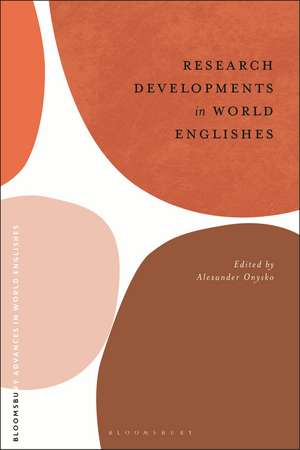Research Developments in World Englishes: Bloomsbury Advances in World Englishes
Editat de Dr Alexander Onyskoen Limba Engleză Paperback – 25 ian 2023
| Toate formatele și edițiile | Preț | Express |
|---|---|---|
| Paperback (1) | 193.62 lei 6-8 săpt. | |
| Bloomsbury Publishing – 25 ian 2023 | 193.62 lei 6-8 săpt. | |
| Hardback (1) | 658.76 lei 6-8 săpt. | |
| Bloomsbury Publishing – 14 iul 2021 | 658.76 lei 6-8 săpt. |
Preț: 193.62 lei
Preț vechi: 250.59 lei
-23% Nou
Puncte Express: 290
Preț estimativ în valută:
37.05€ • 38.61$ • 30.68£
37.05€ • 38.61$ • 30.68£
Carte tipărită la comandă
Livrare economică 03-17 aprilie
Preluare comenzi: 021 569.72.76
Specificații
ISBN-13: 9781350249592
ISBN-10: 1350249599
Pagini: 322
Ilustrații: 28 bw illus
Dimensiuni: 156 x 234 x 25 mm
Greutate: 0.45 kg
Editura: Bloomsbury Publishing
Colecția Bloomsbury Academic
Seria Bloomsbury Advances in World Englishes
Locul publicării:London, United Kingdom
ISBN-10: 1350249599
Pagini: 322
Ilustrații: 28 bw illus
Dimensiuni: 156 x 234 x 25 mm
Greutate: 0.45 kg
Editura: Bloomsbury Publishing
Colecția Bloomsbury Academic
Seria Bloomsbury Advances in World Englishes
Locul publicării:London, United Kingdom
Caracteristici
Highlights and emphasizes the connections between research in world Englishes and concurrent research in fields such as multilingualism, language contact, cultural conceptualizations, and globalization
Notă biografică
Alexander Onysko is Professor of English Linguistics at the University of Klagenfurt, Austria.
Cuprins
List of Figures List of Tables List of Contributors Acknowledgments 1. Where are WEs Heading to? An Introduction to the Inaugural Volume of Bloomsbury Advances in World Englishes, Alexander Onysko (University of Klagenfurt, Austria) 2. Decolonizing (World) Englishes, Mario Saraceni (University of Portsmouth, UK) and Camille Jacob (University of Portsmouth, UK)3. "The Communicative Event" in International English(es) as Social Practice: Adducing a Tricodal/Trimodal Theory of the Linguistic Structuring of Social Meaning, Allan James (University of Klagenfurt, Austria)4. Extending the Scope of World Englishes: Interactions across Englishes in Post-Protectorates and at the Grassroots, Christiane Meierkord (University of Bochum, Germany)5. Contact, Asia, and the Rethinking of Englishes in Multilingual Ecologies, Lisa Lim (Curtin University, Australia) and Umberto Ansaldo (Curtin University, Australia)6. Multilingualism and the Role of English in the United Arab Emirates, with views from Singapore and Hong Kong, Peter Siemund (University of Hamburg, Germany), Ahmad Al-Issa (University of Sharjah, United Arab Emirates), Sharareh Rahbari (University of Hamburg, Germany) and Jakob R. E. Leimgruber (University of Basel, Switzerland)7. The History of English Language Attitudes within the Multilingual Ecology of South Africa, Susan Coetzee-Van Rooy (North West University, South Africa) and Bertus Van Rooy (University of Amsterdam, The Netherlands) 8. Transnational Dialect Contact and Language Variation and Change in World Englishes, Rebecca Lurie Starr (National University of Singapore, Singapore)9. "I Don't Get It": Researching the Cultural Lexicon of Global Englishes, David Crystal (University of Bangor, UK)10. Colonial Cultural Conceptualizations and World Englishes, Frank Polzenhagen (University of Koblenz-Landau, Germany), Anna Finzel (University of Potsdam, Germany) and Hans-Georg Wolf (University of Potsdam, Germany)11. Individual Lives in Collectivist Faces: On Social Norms in a Radio Show, Eric A. Anchimbe (University of Bayreuth, Germany)12. Teaching (About) World Englishes and English as a Lingua Franca, Andy Kirkpatrick (Griffith University, Australia)13. Documenting World Englishes in the Oxford English Dictionary: Past Perspectives, Present Developments, and Future Directions, Danica Salazar (Oxford University Press)Index
Recenzii
This timely edited volume provides a much-needed critical reflection on the existing research paradigm and presents future directions in the study of world Englishes. A must-read for scholars who are committed to capturing the complexity of English(es) today at both individual and societal levels.
The contributors, many of them distinguished members of the series' advisory board, put on the agenda fruitful debates of linguistic and wider societal relevance and showcase neglected as well as novel avenues of World Englishes research. This inaugural volume successfully whets the appetite for the future volumes in this series.
This first volume contributes a great deal to getting out of the impasse in which some authors argue the WE paradigm has been locked in recent years, between form and function on the one hand, and social and historical approaches on the other.
The contributors, many of them distinguished members of the series' advisory board, put on the agenda fruitful debates of linguistic and wider societal relevance and showcase neglected as well as novel avenues of World Englishes research. This inaugural volume successfully whets the appetite for the future volumes in this series.
This first volume contributes a great deal to getting out of the impasse in which some authors argue the WE paradigm has been locked in recent years, between form and function on the one hand, and social and historical approaches on the other.



